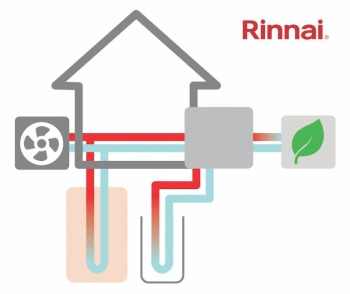Rinnai’s Chris Goggin looks in-depth at public information regarding heat pumps and other low carbon products being potentially diluted by recent changes to social media’s stance on fact-checking. The alternative heating and hot water technologies are receiving some adverse media coverage due to misinformation and sometimes disinformation. Installations of any heating and hot water – or air-cooling system, due to their very nature, must be based on accurate site information to facilitate a precise system that delivers the required performance.
Changes in the fact-checking status of the major brands of social media could lead to unwelcome impact on the stringent fact-based user-conditions needed when installing or designing heating and hot water delivery systems. Major social media outlets have publicly reduced their commitment towards fact-checking, which could lead to accredited and trusted sources of information and data being devalued.
 As UK usage of heat pumps, and other low carbon technologies, continues to grow, current public knowledge regarding alternative DHW and heating is not at a satisfactory level of comprehension. And because of poor levels of public understanding many customers who require low carbon energies and technology often order solutions that are not suited towards property requirements.
As UK usage of heat pumps, and other low carbon technologies, continues to grow, current public knowledge regarding alternative DHW and heating is not at a satisfactory level of comprehension. And because of poor levels of public understanding many customers who require low carbon energies and technology often order solutions that are not suited towards property requirements.
Rinnai’s objective is to equip the UK customer with product and complete system data that demonstrates the accurate value of overall system performance. One such methodology of understanding is SPF (Seasonal Performance Factor).
Heat pump efficiency is measured using Coefficient of Performance (COP). The coefficient of performance (COP) is a measure of the efficiency of a heat pump, defined as the ratio of useful heat produced from the energy used. Essentially, it is a measure of how effectively a system converts energy into heating.
An additional measurement extensively used in the industry is the Seasonal Coefficient of Performance (SCOP), which is the average COP over a full heating season. Unlike the Coefficient of Performance (COP), which presents an outline of the heat pump’s efficiency at a definite moment, SCOP takes into account the variable outdoor temperatures and operating environments throughout the season. This method provides a more realistic picture of how effective the heat pump will be on an annual basis.
Due to the limited knowledge regarding the entire system in many commercial buildings these measurements can sometimes lead to a perception of underperformance of the heat pump system. This in turn lowers customer expectations, damages the reputation of heat pump technology and lowers confidence within the specification process. The lack of congruence between the expected heat pump performance and actual system performance can only be overcome by a complete system thinking approach.
SCOP calculations do not take into consideration the various additional factors that occur daily during heat pump operation. This could include immersions operating for large, high heat loss recovered by backup heaters, system pumps or ancillaries within the secondary system utilizing excess energy.
To account for these losses research has been conducted to calculate the SPF of a heating system. Over the period of a year this measurement evaluates the overall heat supplied to the total electricity used as the outdoor temperature fluctuates. The SPF accounts for many additional variables that can only be accurately understood by installing data loggers to effectively monitor the system and show an accurate image of hourly operations.
Join the free CIBSE accredited SPF CPD today.
Nevertheless, these calculations can also be used from a design point of view prior to installation. Estimates can be made that may differ from real-time operation yet provide the customer with a clearer picture of how their system will perform throughout the year. Post installation, data loggers can be attached to verify this design SPF.
As current social media is now creating distance between audience and fact, UK contractors, installers and all other customers should prioritise manufacturers of carbon reducing technology who present technically led data that demonstrates system efficiency. One of Rinnai key objectives is to provide customers with accurate, consistent, and transparent product data the makes decision making easier.
